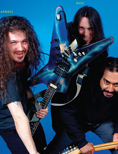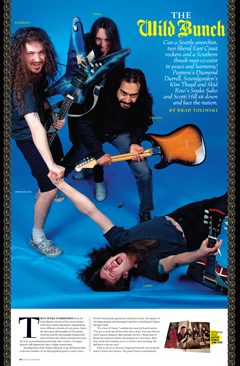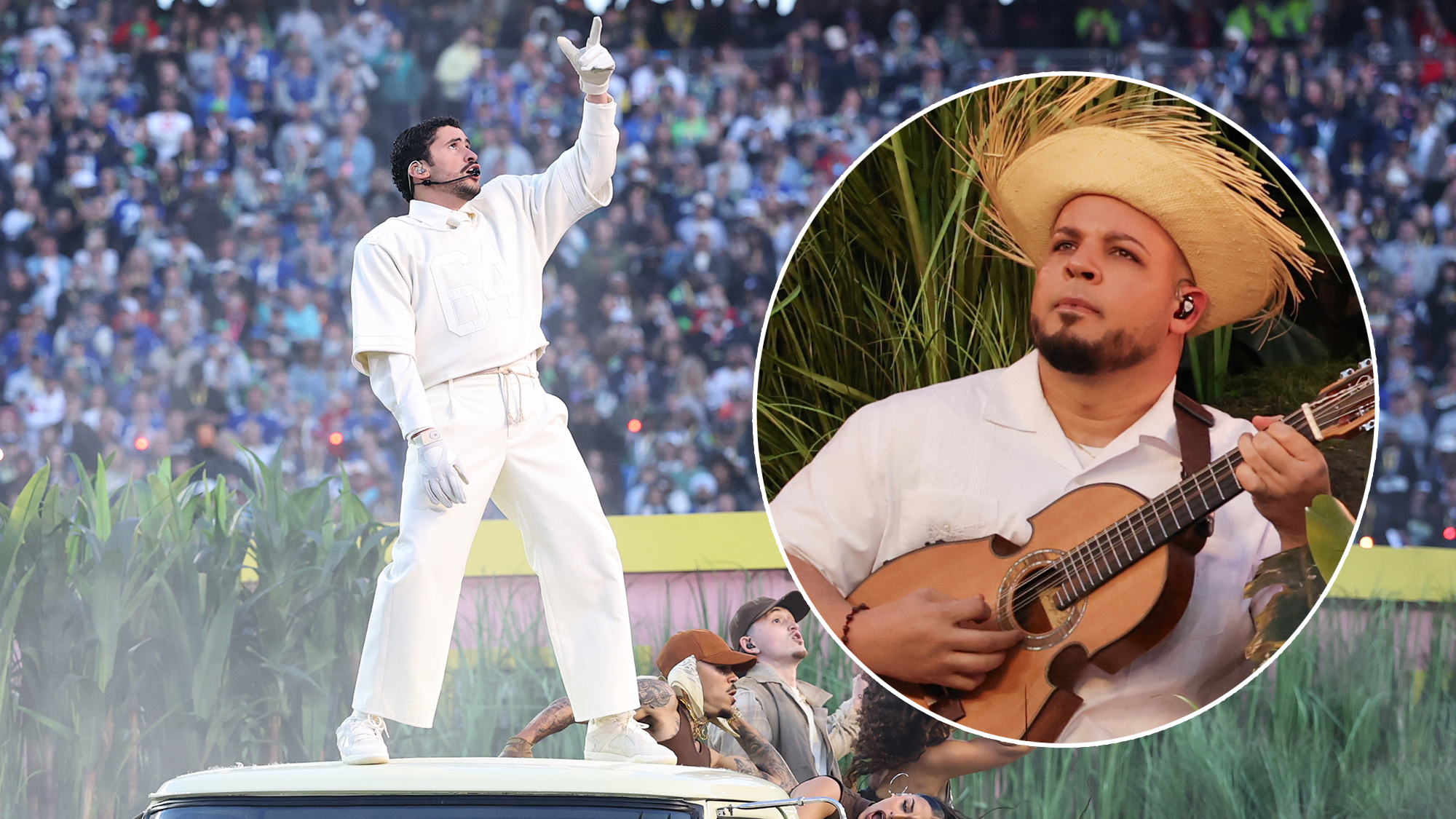Dimebag Darrell: The Wild Bunch
All the latest guitar news, interviews, lessons, reviews, deals and more, direct to your inbox!
You are now subscribed
Your newsletter sign-up was successful


Can a Seattle anarchist, two liberal East Coast rockers and a Southern thrash man co-exist in peace and harmony? Pantera’s Diamond Darrell, Soundgarden’s Kim Thayil and Skid Row’s Snake Sabo and Scotti Hill sit down and face the nation.
They were summoned from the most distant reaches of the Unites States: four heavy metal dignitaries, representing three different schools of rock guitar. Given the divergent philosophies of the parties involved and the increasingly fragmented state of hard rock, there’s genuine fear that, far from proceeding harmoniously, this conclave of magnaheavies will degenerate into a vulgar street brawl.
Soundgarden’s Kim Thayil, debonair in an old flannel shirt, is the first member of the distinguished panel to enter Guitar World’s luxuriously appointed conference room. The master of all things grungy and alternative clutches a small plastic bag in his right hand.
“It’s a box of Clorox,” confides the swarthy Seattle native. “I’ve got to wash my clothes after this is done. You can tell how well a band is doing by their laundry service. I think Guns N’ Roses has someone whose sole purpose is to dry clean. Skid Row sends their laundry out to a service every morning. We still have to do our own.”
Next to arrive is Pantera’s Diamond Darrell, one of thrash music’s finest new talents. The good Texan is immediately recognizable by his blue Dean Flying V guitar, an impressive thatch of curly hair and unusually long goatee, which he has partially dyed blood-red. When photographer Lorinda Sullivan compliments the cowboy from hell on his startling mane, he sneers good-naturedly. “My hair’s a pain in live performance. I’m always inhaling it: I almost choked to death a couple of times.”
After several minutes of general introductions, hors d’oeuvres and Rolling Rock beer and light conversation, the East Coast contingent arrives. Skid Row’s Dave “The Snake” Sabo and his collaborator, Scotti Hill, burst in and immediately inquire about the evening’s refreshments. After it is announced—to much applause and enthusiastic whooping—that
GW is picking up the tab, Darrell, Sabo, Hill and Thayil, distinguished headbangers of state, sit to talk.
All the latest guitar news, interviews, lessons, reviews, deals and more, direct to your inbox!
*****
GUITAR WORLD The musicians assembled here all grew up in a different region of the United States—Skid Row on the East Coast, Soundgarden in the Northwest and Pantera in the South. How, if at all, were your careers influenced by your point of origin?
SNAKE SABO Location was a real important factor in our success. Kiss was the first band that made a real impact on me, and they were from New York City, which is only a 35-minute drive from where I was born. It probably sounds silly, but their proximity made me feel that I could accomplish what they had accomplished. Success didn’t seem as remote as it might have if I had lived in middle America.
Also, all of the record companies had offices in Manhattan, which was just across the Hudson River. So when I started writing music and getting demo tapes together, I just talked my way through every door I could. I was very fortunate in that sense. Eventually we were signed to a New York–based label.
GW How about you, Kim?
KIM THAYIL We were affected by our location, but for the exact opposite reason. I think our sound developed because Seattle is relatively isolated. We were allowed to evolve naturally, independent of commercial pressures and various media trends. We didn’t really have the opportunity or desire to play for record people. No one even thought of getting signed, so we just did our own thing.
We were more influenced by Washington’s strong punk, hardcore and alternative scenes than by anything that came out of Los Angeles. Whenever bands like Sonic Youth, Minor Threat, Big Black from Chicago, the Butthole Surfers from Texas and Black Flag came into town, all the local musicians went to see them.
Scotti and Snake were fortunate to grow up near New York, because it has such a rich musical history. We had to create our own history. Our main point of reference was each other. On the positive side, it was a very supportive environment. All the bands went to each other’s gigs, and we constantly exchanged ideas.
DIAMOND DARRELL We had the worst of all worlds in Texas, in that we didn’t really have a supportive local scene or any record companies. I was mostly influenced by bands like Black Sabbath and Judas Priest—Metallica’s Kill ’Em All was also a hell of an inspiration.
GW All of you have at one time or another cited Kiss as a primary influence.
SCOTTI HILL I didn’t know I was going to be a guitar player until I heard Kiss’ Alive! I still remember the first time I heard it—I was with my cousin, down in his mom’s basement, drinking my first shot of sloe gin. I couldn’t believe the sound of the music and the intensity of the crowd. The next thing I knew, I was standing on a couch playing air guitar.
GW In the April 1992 Guitar World interview with Darrell, he said he felt that buying a Les Paul and a Marshall was the “easy way out,” because you know they’re going to sound good.
THAYIL I agree—that is the easy way out. These days, everything sounds like it’s being played through a Les Paul and a Marshall. And if you don’t have that combination, somebody will try to make you dial it in.
GW Maybe that’s why people dig you guys: you each have your own signature sound. Scotti and Snake, what are you two using on tour?
SNAKE A Les Paul and a Marshall— Ace Frehley gave them to me! [laughs all around] Actually, we’re using the same things we used in the studio. I’m still using a Rivera amp and an old Ibanez Tube Screamer for my dirty sound, and I’ve added a few things to my rack to help improve my clean sound.
GW All of you seem pretty lowtech. Have you ever investigated any multi-effects units?
DARRELL I never really understood people who were into those things. I mean, just what I need—30 different choruses and 75 watery reverbs. I think those boxes were designed for people that either play New Age music or sit in their room, shoot crank and go, “Wow! Far out!” You can spend so much time fooling around with those things that you never get around to practicing.
THAYIL It’s like you want to tell people, “Remember how good it sounded when you just plugged your guitar into the amp?” Why spend your whole life—and your bank account—trying to duplicate that sound electronically? It doesn’t make sense.
GW Snake, your tone radically changes during the course of a Skid Row performance, so I would imagine your setup is more complex.
SABO You’re partially right. I’m usually the guy who plays the random clean, acoustic and electric 12-string parts, but my setup is still pretty simple. I know it looks like I have Sky Lab under the stage, but I just have a couple of heads and one effects unit—everything else is just backup in case my rig goes down in the middle of a set. I went through hell on the first tour, because my ADA occasionally malfunctioned and I didn’t have anything to fall back on. I vowed that something like that would never happen again.
HILL We’ve taken precautions, but so far neither one of us has had any real problems with the Riveras on this tour. I’ve just had to change my tubes once.
DARRELL I’ve never had any problems. Randalls are solid-state, and they rarely ever give me any trouble. You could drop one off the Empire State Building and it would still work.
GW Darrell, what was your first setup?
DARRELL Dude, I went through a lot of ’em. My first killer amp was a Sunn Beta Lead. It was solid-state, but that Sunn was incredibly loud. I used to say to my friends, “Hey, check it out, it’s only on two.” After that, I bought a Yamaha tube amp with a 12-inch speaker. It sounded good, but I could never get enough drive out of it.
SNAKE I know that amp! Did it have a little parametric EQ built in? I knew a guy in Jersey that had one. He was our local Eddie Van Halen clone. He could play anything by Van Halen, which, at the time, really impressed me.
THAYIL [rolling his eyes] Every town had one of those.
DARRELL Hey, watch it man—I was that dude in Texas. I always played “Eruption” in my solo. Of course, I always fucked up the ending. [laughs all around]
After the Yamaha, I won a Randall halfstack in a contest. As soon as I plugged in, I knew the amp was for me. It really had balls—but it wasn’t perfect. It was a little fuzzy sounding, so I tried cleaning the sound up a little bit with one of the blue MXR sixband equalizers. It was like night and day! That box is god! It’s weird—none of the other MXR equalizers affect my sound in the same way. I’ve got to have the blue one.
GW Darrell, you also get a lot of mileage out of something very simple—your Rocktron Hush 2-B noise gate.
DARRELL You’re right. I set the gate real high to produce the tight, ferocious, rhythmic punch that you hear at the end of “Domination” and in the opening of “Cowboys from Hell.” It’s a little tricky to use live; my guitar tech has to open and close the gate manually. I have everything worked out with him. Basically, he opens the gate for feedback, solos and squeals, and closes it for the tight rhythm parts. It keeps him real busy.
GW One of the biggest trends in rock these days is the renewed interest in rhythm guitar. Why do you think that is?
DARRELL I used to take really long lead breaks, but lately I’ve been keeping my solos to a minimum. I’ve become more interested in creating a band sound than trying to outshine the other guys.
THAYIL I bet the first thing everybody here tried to do was play fast. After a while, though, you realize that speed doesn’t matter. Guitarists are a dime a dozen, and everyone is faster than the next. So it gets down to trying to explore your personal style, whatever that may be. Besides, all this fast stuff just doesn’t rock. Kiss and AC/DC are two great examples of bands that never got caught up in pyrotechnics.
HILL Groove is the shit, man!
THAYIL I remember reading something when I was growing up that really offended me. Someone said they were influenced by Van Halen and Bach. What the hell does Bach have to do with rock and roll? Nothing. I hate when people try to “legitimize” rock by saying that they’re involved in jazz or classical music. Rock doesn’t need that kind of legitimacy. It shouldn’t be accountable to parents, or the musical establishment—and it certainly shouldn’t be accountable to the “nose-in-theair” music establishment. Rock has started to turn into that. People discuss Emerson, Lake and Palmer’s arpeggios and analyze this mode and that mode. It’s sick.
I just don’t understand the point of trying to defend something that obviously stands on its own merits. People are moved by rock music without having to justify it by any established criteria. When I was a kid, my friends would try to convince me that certain rock musicians were better because they inserted jazz or classical references in their playing. I never understood that. Rock, jazz and classical music are separate things.
DARRELL Randy Rhoads was the only guy who was able to pull that off, and that was because he rocked.
GW Kim, you’re not solo-oriented, but whose lead playing inspires you?
THAYIL I was more into punk rock, and punk rock isn’t very technical. I like Paul Leary of the Butthole Surfers, who reminds me of Hendrix because he never overplays. I also dig Zoot Horn Rollo from Captain Beefheart’s band. It sounds like he’s improving because his rhythms are so weird, but from what I understand, his parts are all worked out. Neil Young’s one-note solo in “Cinnamon Girl” is amazing. Ron Ashton of the Stooges is another great player. Lou Reed’s playing on “White Light, White Heat” is scary. I also like the first two Van Halen records.
GW Which Soundgarden song is the most difficult for you to perform?
THAYIL The most difficult song for us, by far, is “Jesus Christ Pose.” It’s real quick, and there are weird muted parts. If I’m being animated onstage, it’s real easy to screw up.
GW What’s the tough song for Skid Row?
HILL I play so shitty live, it doesn’t matter. [laughs]
SABO I had a really bad experience in Iceland while playing “Wasted Time.” My hands started cramping up, and my fingers just went completely out of control. I butchered the song so bad that I was embarrassed to be there. I wanted to walk offstage, because I felt I had let the band and the audience down. I never felt that way in my life. After the show I just sat in a corner and banged my head against the wall. I wanted to quit life. It killed me. The rest of the band was real supportive, and told me it was okay, but it really didn’t help.
Later, thank God, I found a solution to the problem. I went to the chiropractor who works with Guns N’ Roses, and he showed me how to prevent what happened with the help of massage. I haven’t had a problem since.
HILL I’ve had little physical things go wrong right before really big gigs. You know, those shows where management is saying things like [assumed a gruff voice], “This is really fucking important. If you don’t do good, your career is over!” I’ll wake up in the morning of the show screaming, “Oh shit, I can’t feel my legs!” [uproarious laughter all around]
DARRELL I’m not tryin’ to be different, man, but I have so much fun onstage. I’ve never had any problems executing any of my parts. The lead on “Domination” flips me out a little bit sometimes, because it has a real weird stretch, but that’s about it. We write the songs for the stage. Sorry, I tried hard to think of something...
HILL How about when your spit gets caught in your facial hair?
DARRELL Actually, that is a big problem!
GW Darrell, what’s the best thing about being the only guitar player in Pantera?
DARRELL The freedom. It’s very easy to improvise and play different variations in a trio format. But when there are two guitars, you’re always hemmed in by what the other person is playing. My main points of reference are the first two Van Halen records. I’m pretty much influenced by the old school.
GW Are your recorded solos improvised?
DARRELL Definitely. I’m always trying to add things at the last minute, always trying to top myself.
HILL Yeah, I’ll play the greatest thing I’ve ever played in my life and then say, “Let me try that again.” When we were recording “The Threat,” I remember Snake played a great solo, but was still biting his fingernails down to the bone. It was like, “Hey, Snake, you want some salt for that?”
GW Kim, you have the best of both worlds. Sometimes Chris plays rhythm, and sometimes you play by yourself.
THAYIL It’s nice to have that option, but I generally prefer to be the only guitarist because it gives me more freedom. Like Darrell was saying before, another guitar part can really box you in. I’ve also noticed that if I screw up a guitar part, people look at me, and if Chris screws up a guitar part, people still look at me—because I’m the main guitar player.
GW I think it’s significant that, despite the regional and stylistic differences that separate the three bands gathered here, we’ve managed to find a lot of common ground.
HILL All that’s missing is someone from North Dakota.
GW Yeah, I wonder why there are no guitar heroes from North Dakota?
HILL I’m sure there will be. Some North Dakotan is probably out there, even as we speak, burying everybody.
